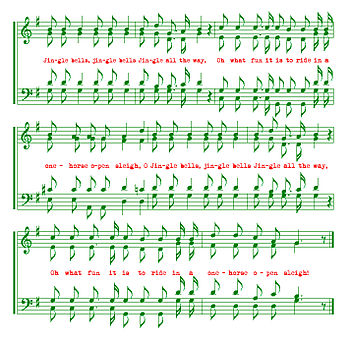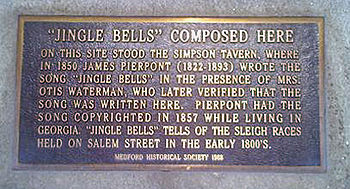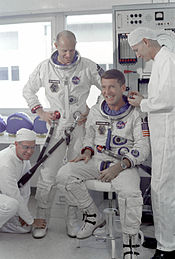- Jingle Bells
-
 Musical notation for the chorus of "Jingle Bells"
Musical notation for the chorus of "Jingle Bells"
 Plaque at 19 High Street, Medford, Massachusetts
Plaque at 19 High Street, Medford, Massachusetts
"Jingle Bells" is one of the best-known and commonly sung winter songs in the world. It was written by James Lord Pierpont (1822–1893) and published under the title "One Horse Open Sleigh" in the autumn of 1857. Even though it is commonly thought of as a Christmas song, it was actually written and sung for Thanksgiving.[1] It was mistakenly branded as a Christmas song because being extremely popular at Thanksgiving, it was sung again around Christmas.
Contents
Composition
James Lord Pierpont originally composed his song in 1850. A plaque commemorating the "birthplace" of "Jingle Bells" adorns the side of a building in Medford, Massachusetts. Pierpont wrote the song there, at the former Simpson Tavern, now 19 High Street in the center of Medford Square. According to the Medford Historical Society, the song was inspired by the town's popular sleigh races during the 1800s.
"Jingle Bells" was originally copyrighted with the name "One Horse Open Sleigh" on September 16, 1857.[2] It was reprinted in 1859 with the revised title of "Jingle Bells, or the One Horse Open Sleigh". The song has since passed into public domain.
Music historian James Fuld notes that "the word jingle in the title and opening phrase is apparently an imperative verb."[3] However, it is commonly taken to mean a certain kind of bell.
Lyrics
The first verse and chorus are the most well-remembered sections of "Jingle Bells":
- Dashing through the snow
- In a one-horse open sleigh
- O'er the fields we go
- Laughing all the way
- Bells on bobtail ring
- Making spirits bright
- What fun it is to laugh and sing
- A sleighing song tonight!
- (chorus)
- Jingle bells, jingle bells,
- Jingle all the way.
- Oh! what fun it is to ride
- In a one-horse open sleigh.
- Jingle bells, jingle bells,
- Jingle all the way;
- Oh! what fun it is to ride
- In a one-horse open sleigh.
Although less well-known than the opening, the remaining verses depict high-speed youthful fun. In the second verse, the narrator takes a ride with a girl and loses control of the sleigh:
- A day or two ago
- I thought I'd take a ride
- And soon, Miss Fanny Bright
- Was seated by my side,
- The horse was lean and lank
- Misfortune seemed his lot
- He got into a drifted bank
- And then we got upsot.
- |: chorus :|
In the next verse (which is often skipped), he falls out of the sleigh and a rival laughs at him:
- A day or two ago,
- The story I must tell
- I went out on the snow,
- And on my back I fell;
- A gent was riding by
- In a one-horse open sleigh,
- He laughed as there I sprawling lie,
- But quickly drove away.
- |: chorus :|
In the last verse, after relating his experience, he gives equestrian advice to a friend to pick up some girls, finds a faster horse, and take off at full speed:
- Now the ground is white
- Go it while you're young,
- Take the girls tonight
- and sing this sleighing song;
- Just get a bobtailed bay
- Two forty as his speed
- Hitch him to an open sleigh
- And crack! you'll take the lead.
- |: chorus :|
Notes to lyrics
^ a: The horse's name is not "Bobtails" or "Bob". The horse is described as "bobtail" or "bobtailed" which refers to the tail as being "bobbed": cut shorter or docked, which was commonly done to the tails of carriage horses to keep them neat and reduce the chance of the tail getting caught in the reins.
^ b: An archaic past participle of upset, in this instance meaning "capsized", but was also slang for "drunk or intoxicated", perhaps by association with the British term "sot" (drunkard).
^ c: Two forty refers to a mile in two minutes and forty seconds at the trot, or 22.5 miles per hour. This is a good speed, and suggests the horse should be a Standardbred.The "Jingle Bells" tune is used in French and German songs, although the lyrics are unrelated to the English lyrics. Both celebrate winter fun. The French song, titled Vive le vent ("Long Live the Wind"), was written by Francis Blanche[4][5] and contains references to Father Time, Baby New Year, and New Year's Day. There are several German versions of "Jingle Bells", including the popular Roy Black versions of Christkindl and Christmastime.[6]
Original lyrics
The 1857 lyrics differed slightly from those we know today. It is unknown who replaced the words with those of the modern version.[3]
- Dashing through the snow
- In a one-horse open sleigh
- O'er the hills we go
- Laughing all the way.
- Bells on bobtail ring
- Making spirits bright
- Oh what sport to ride and sing
- A sleighing song tonight.
- |: chorus :|
- Jingle bells, jingle bells
- Jingle all the way!
- O what joy it is to ride
- In a one-horse open sleigh.
- A day or two ago
- I thought I'd take a ride
- And soon Miss Fannie Bright
- Was seated by my side
- The horse was lean and lank
- Misfortune seemed his lot
- He got into a drifted bank
- And we - we got upset
- |: chorus :|
- A day or two ago
- The story I must tell
- I went out on the snow
- And on my back I fell
- A gent was riding by
- In a one-horse open sleigh
- He laughed as there I sprawling lie
- But quickly drove away
- |: chorus :|
- Now the ground is white
- Go it while you're young
- Take the girls tonight
- And sing this sleighing song
- Just get a bobtailed bay
- Two forty is his speed
- Hitch him to an open sleigh
- And crack! You'll take the lead.
- |: chorus :|
Melody
The original 1857 "Jingle Bells" had a slightly different chorus featuring a more classical-style melody. The "I V vi III IV I V I" chord progression is a common theme in classical music; except for the final two chord changes, the melody as originally written follows the same pattern as Pachelbel's Canon, resembling the tune Jolly Old Saint Nicholas, which appeared about fifty years after "Jingle Bells".
Recordings and performances
See also: List of artists who have recorded "Jingle Bells"James Lord Pierpont's 1857 composition "Jingle Bells" became one of the most performed and most recognizable secular holiday songs ever written, not only in the United States, but around the world. In recognition of this achievement, James Lord Pierpont was voted into the Songwriters Hall of Fame.
"Jingle Bells" was first recorded by the Edison Male Quartette in 1898 on an Edison cylinder as part of a Christmas medley entitled "Sleigh Ride Party". In 1902, the Hayden Quartet recorded "Jingle Bells".
In 1943, Bing Crosby and the Andrews Sisters recorded "Jingle Bells" as Decca 23281 which reached No. 19 on the charts and sold over a million copies. In 1941, Glenn Miller and His Orchestra with Tex Beneke, Marion Hutton, Ernie Caceres and the Modernaires on vocals had a No. 5 hit with "Jingle Bells" on RCA Victor, as Bluebird 11353. In 1935, Benny Goodman and His Orchestra reached No. 18 on the charts with their recording of "Jingle Bells". In 1951, Les Paul had a No. 10 hit with a multi-tracked version on guitar. In 2006, Kimberley Locke had a No. 1 hit on the Billboard Adult Contemporary chart with a recording of the song.
"Jingle Bells" has been performed and recorded by a wide variety of musical artists, including Louis Armstrong, The Beatles, The Chipmunks, Judy Collins, Nat King Cole, Perry Como, Placido Domingo, Duke Ellington, Ella Fitzgerald, Spike Jones, Barry Manilow, The Million Dollar Quartet (Elvis Presley, Carl Perkins, Jerry Lee Lewis), NSync, Luciano Pavarotti, Smokey Robinson and the Miracles, The Sex Pistols, Frank Sinatra, Fats Waller and Yello, among many others.
In 1955, Don Charles, from Copenhagen, Denmark, recorded a novelty version with dogs barking to the melody of "Jingle Bells" as RCA 6344, and a version credited simply to "St. Nick" called "Jingle Bells (Laughing All the Way)" features someone laughing, rather than singing, the entire song.
 Wally Schirra and Tom Stafford of Gemini VI (1965)
Wally Schirra and Tom Stafford of Gemini VI (1965)
First song in outer space
"Jingle Bells" was the first song broadcast from space, in a Christmas-themed prank by Gemini 6 astronauts Tom Stafford and Wally Schirra. While in space on December 16, 1965, they sent this report to Mission Control: "We have an object, looks like a satellite going from north to south, probably in polar orbit... I see a command module and eight smaller modules in front. The pilot of the command module is wearing a red suit...." The astronauts then produced a smuggled harmonica and sleighbells and broadcast a rendition of "Jingle Bells."[7] The harmonica, shown to the press upon their return, was a Hohner "Little Lady", a tiny harmonica approximately one inch long, by 3/8 of an inch wide.
Parodies and homages
Like many simple, catchy, and popular melodies, "Jingle Bells" is often the subject of parody. "Jingle Bells, Batman Smells" has been a well-known parody since the mid 1960s,[8] with many variations on the lyrics.[9] Bart Simpson sings this version on The Simpsons, the first time being on "Simpsons Roasting on an Open Fire".[10] The Joker himself also sings it in the Batman: The Animated Series episode "Christmas with the Joker". In addition, comedian Phil Snyder recorded a full-length version of the song, adding new verses utilising other comic superheroes.[11]
Another popular spoof of the song celebrates Halloween, and is called "Pumpkin Bells", conceived by Peanuts. It is referred to as a "Pumpkin Carol" saying how fun Halloween really is with the "Great Pumpkin".
"Jingle Bell Rock" by Bobby Helms pays homage to "Jingle Bells", directly referencing the source song's lyrics, but with a different melody. Originally recorded and released by Helms in a rockabilly style, "Jingle Bell Rock" has itself since become a Christmas standard.[12]
Parodies or novelty versions of the song have been recorded by many artists, including "Yogi Yorgesson" ("Yingle Bells") and Da Yoopers ("Rusty Chevrolet").
See also
- Jingle bell (sleigh bell)
- Jingle Bell Rock
- Jingle Belle
References
- Notes
- ^ "Jingle Bells (Christmas Read-Aloud Stories, Carols, & More)". Reader's Digest. http://www.readersdigest.ca/christmas/kind_christmas/jingle_bells.html. Retrieved 2010-11-19.
- ^ "J. Pierpont, "One Horse Open Sleigh", Boston: Oliver Ditson & Co., deposited 1857 with Library of Congress". Library of Congress. http://memory.loc.gov/cgi-bin/ampage?collId=sm1820&fileName=sm2/sm1857/620000/620520/mussm620520.db&recNum=0&itemLink=r?ammem/mussm:@filreq(@field(NUMBER+@band(sm1857+620520))+@field(COLLID+sm1820))&linkText=0. Retrieved 2006-12-26.
- ^ a b James J. Fuld, The Book of World-Famous Music, Fifth Edition, Dover Publications (New York), p. 313.
- ^ "Vive le vent (French chorus and literal English translation)". About.com. http://french.about.com/library/blxm-vivelevent.htm. Retrieved 2006-12-26.
- ^ "Vive le vent (with verses and augmented refrain)". Paroles.net. http://www.paroles.net/chansons/23868.htm. Retrieved 2006-12-26.
- ^ "Roy Black, "Jingle Bells" (German lyrics and literal English translation)". About.com. http://german.about.com/library/blmus_jingleb.htm. Retrieved 2006-12-26.
- ^ Smithsonian Magazine. December 2005. pp. 25.
- ^ Studwell, William Emmett (1994). The Popular Song Reader: A Sampler of Well-Known Twentieth Century-Songs. Psychology Press. pp. 224.
- ^ Bronner, Simon J. (1988). American Children's Folklore. August House. pp. 105.
- ^ Groening, Matt (2001). The Simpsons season 1 DVD commentary for the episode "Simpsons Roasting on an Open Fire" (DVD). 20th Century Fox.
- ^ [[cited website |date=2009| title="Jingle Bells Batman Smells" Christmas Song with New Verses by Phil Snyder| http://www.youtube.com/watch?v=Ud3xdj_RQ_A%7Cpublisher=YouTube}}
- ^ Collins, Ace (2010). Stories Behind the Greatest Hits of Christmas. Zondervan. pp. 101–103.
External links
- Lyrics to "Jingle Bells"
- An original arrangement of "The One Horse Open Sleigh" at The Library of Congress
- The Story of "Jingle Bells"
- Free arrangements for piano and voice from Cantorion.org
- James Lord Pierpont – discussion of the song's history
- Complete lyrics to "Jingle Bells"
- Story of the Singing Dogs
- Jingle Belles
Categories:- 1857 songs
- Christmas songs
Wikimedia Foundation. 2010.
